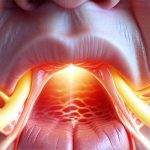Bloating is a common digestive complaint that many people experience, often leaving them feeling uncomfortable and self-conscious. It’s characterized by a sensation of fullness, tightness, and sometimes even visible abdominal distension. While bloating can stem from a wide array of factors—dietary choices being prominent among them—the connection between specific foods and delayed bloating isn’t always straightforward. We often think about immediate reactions to food, but the digestive process is complex, and symptoms like bloating can appear hours or even days after consumption. This delay makes pinpointing the culprit difficult, leading many to wonder if seemingly innocuous treats like ice cream could be contributing to their discomfort.
The perception that ice cream might cause delayed bloating arises from its composition and how our bodies process it. Ice cream typically contains several components known to potentially induce digestive issues in susceptible individuals: lactose (milk sugar), fat, and often artificial sweeteners or other additives. The digestion of these elements can vary significantly depending on individual tolerance levels and underlying digestive health. Furthermore, the rapid consumption typical with ice cream – quickly eating a large volume – can overwhelm the digestive system, making it harder to efficiently process everything. Understanding the interplay between these components and the digestive system is crucial for unraveling this potential connection.
The Role of Lactose & Digestive Sensitivity
Lactose intolerance, even in mild forms, is perhaps the most frequently cited reason why ice cream might lead to bloating. Lactase is the enzyme responsible for breaking down lactose into simpler sugars (glucose and galactose) that the body can easily absorb. When lactase production is insufficient – a condition known as lactose deficiency or intolerance – undigested lactose ferments in the large intestine, producing gas as a byproduct. This fermentation process can cause bloating, cramping, and diarrhea. It’s important to note:
- Lactose intolerance exists on a spectrum; some individuals experience significant symptoms with even small amounts of dairy, while others may tolerate it relatively well.
- Delayed onset is common because the time it takes for lactose to reach the large intestine and undergo fermentation varies between individuals. Symptoms can appear anywhere from 30 minutes to several hours after consumption.
- Many ice cream flavors contain substantial amounts of lactose, even those that don’t overtly taste like dairy.
Beyond diagnosed lactose intolerance, a general sensitivity to dairy products can also trigger bloating in some people. This isn’t the same as an allergy or full-blown intolerance but rather a less severe reaction where the digestive system struggles slightly more with processing dairy components. The fat content in ice cream further complicates matters. Fat slows down gastric emptying – the rate at which food leaves the stomach – giving undigested lactose more time to reach the large intestine and ferment, exacerbating bloating symptoms.
The type of ice cream also plays a role. Premium ice creams, often with higher fat content and richer ingredients, are potentially more problematic than lighter options. Similarly, sorbets (dairy-free) generally don’t contain lactose but may still cause bloating due to other ingredients or sensitivities. Artificial sweeteners commonly found in “light” or “sugar-free” ice cream can also be a contributing factor for some individuals, as they are poorly absorbed and fermented by gut bacteria, leading to gas production.
Fat Content & Digestive Slowdown
Ice cream is undeniably rich in fat. While fats are essential for health, excessive amounts – or rapid consumption of fatty foods – can disrupt the digestive process and contribute to bloating. As mentioned previously, dietary fat slows down gastric emptying. This isn’t necessarily a bad thing; it helps with nutrient absorption. However, prolonged stomach residence time means more opportunity for fermentation in the lower digestive tract if there are underlying sensitivities like lactose intolerance or issues with carbohydrate digestion.
The gallbladder plays a vital role in digesting fats. It releases bile, which emulsifies fat, making it easier to break down and absorb. Individuals with gallbladder issues – such as gallstones or inflammation – may struggle to properly digest fats, leading to bloating, nausea, and abdominal pain after consuming high-fat foods like ice cream. Furthermore, the body’s attempt to process a large amount of fat can lead to increased intestinal motility in some individuals, contributing to gas production and discomfort.
It’s also worth considering that certain types of fats are more easily digested than others. Ice creams often contain saturated fats, which take longer to digest compared to unsaturated fats. This difference contributes to the overall digestive load and potential for delayed bloating. Ultimately, the body’s ability to efficiently process fat varies greatly depending on individual physiology and underlying health conditions.
Identifying Potential Triggers
Pinpointing whether ice cream is causing your delayed bloating requires a bit of detective work. Here are some steps you can take:
- Food Diary: Keep a detailed food diary, meticulously recording everything you eat and drink, along with the timing and severity of any bloating symptoms. Be specific about the type of ice cream consumed (flavor, brand, fat content). This will help identify potential correlations between ice cream consumption and symptom onset.
- Elimination Diet: Consider a temporary elimination diet where you remove suspected trigger foods – including dairy products and high-fat foods – for a period of time (e.g., 2-3 weeks) to see if symptoms improve. Then, gradually reintroduce these foods one at a time, carefully monitoring your body’s reaction.
- Lactose Tolerance Test: If you suspect lactose intolerance, consider undergoing a lactose tolerance test or hydrogen breath test conducted by a healthcare professional. These tests can help determine whether your body is effectively digesting lactose.
Gut Microbiome & Fermentation
The composition of your gut microbiome—the trillions of bacteria residing in your digestive tract—plays a significant role in how you process food and experience bloating. An imbalance in gut bacteria (known as dysbiosis) can lead to increased fermentation, gas production, and overall digestive discomfort. Certain bacterial strains thrive on undigested carbohydrates like lactose, exacerbating bloating symptoms.
- Probiotics – beneficial bacteria – can help restore balance to the gut microbiome and improve digestion. Incorporating probiotic-rich foods (e.g., yogurt, kefir) or taking a probiotic supplement may offer some relief.
- Prebiotics—foods that feed beneficial bacteria—can also support a healthy gut microbiome. Examples include garlic, onions, bananas, and oats.
- The type of ice cream consumed can impact the gut microbiome. High-sugar and artificial sweetener content in some varieties can promote the growth of less desirable bacterial strains.
Addressing Underlying Digestive Issues
Delayed bloating isn’t always solely attributable to ice cream or specific foods. Often, it’s a symptom of underlying digestive issues that need to be addressed. Conditions like Irritable Bowel Syndrome (IBS), Small Intestinal Bacterial Overgrowth (SIBO), and food sensitivities can all contribute to chronic bloating.
- If you experience persistent bloating despite dietary changes, it’s essential to consult with a healthcare professional for proper diagnosis and treatment.
- Simple lifestyle modifications – such as eating smaller, more frequent meals, chewing food thoroughly, staying hydrated, and managing stress – can also help alleviate bloating symptoms.
- Focusing on overall digestive health is paramount. This includes prioritizing fiber intake, limiting processed foods, and engaging in regular physical activity. Can GERD be a cause of bloating? Understanding the connection between these conditions can provide valuable insights. Remember that a holistic approach to gut health will yield the most sustainable results. Furthermore, Can eating too quickly contribute to digestive discomfort and bloating? The speed at which we consume food can significantly impact our ability to digest it effectively. If you suspect a connection between your diet and bloating, can eating the same food every day cause reactions? Exploring this possibility is crucial for identifying potential triggers. Additionally, issues like how reflux can cause bloating symptoms should be considered. Finally, Can GERD cause ringing or hearing issues? These seemingly unrelated symptoms may be connected to digestive health.


















